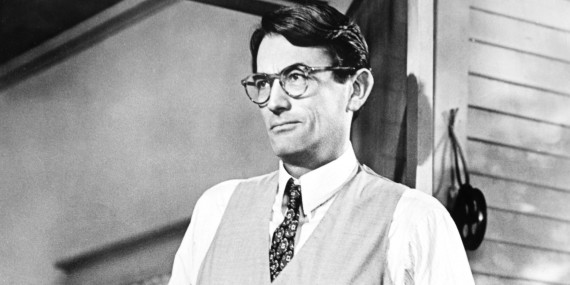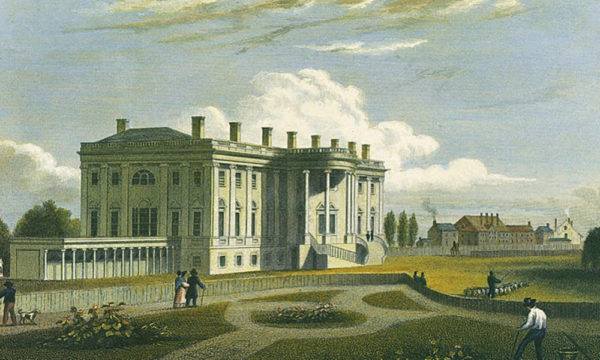Harper Lee betrayed the literary establishment and many of her readers with the recent publication of her novel, Go Set a Watchman. The novel was originally written before the acclaimed, To Kill a Mockingbird and when it was published last year the literary public, readers and critics, were most impatient to read it. Many of them had reactions ranging from disappointment to horror. Miss Lee’s treason was founded upon literary ambition, and I might add a good literary ambition; the desire to write a novel about a young woman coming to terms with the real world of moral complexity—no Puritan or Manichaean can ever forgive such insolence. And since many of the genus boobus americanus carry with them the old Puritan gene, well Harper Lee was doomed.
The charm of To Kill a Mockingbird is found in our author’s considerable skill at showing us the world through a child’s eyes, and in so doing she gave to American literature the charming figure of Jean Louise Finch, better known as Scout, and the iconic figure of her father Atticus Finch. Atticus is the local attorney in Maycomb, Alabama who takes on the criminal defense of Tom Robinson, an African-American wrongly accused of raping a white woman. Many readers fell in love with the character of Atticus because he seemed to be a Southern liberal facing down the ignorant and benighted racists of Maycomb. The novel’s real power was its exploration of the themes of justice and fortitude. As Scout was awakening to the wider world around her, she, like all youngsters, gravitates to the virtue of justice and is an admirer of the virtue of fortitude. Both of these she finds in her father Atticus who is willing to defend the innocent at a considerable social cost, as well as in the face of threats to his physical person. Justice and fortitude are the virtues most closely related to sentiment, which is to say we can feel injustice and desire to rectify it, and we can be inspired by fortitude and wish to imitate it. So as Atticus is to Tom Robinson, so Scout is to Boo Radley. It is a good story, and one that all readers, but especially sentimental readers and critics readily embraced.
The truly great novel, however, attempts more. In Go Set a Watchman, Miss Lee attempted to explore the operation of prudence and temperance in the more morally complex world of the South in the 1950s. Scout, now grown up to be Miss Jean Louise Finch, has come home from New York City for her annual summer visit. Maycomb is caught up in the throes of the Civil Rights Revolution (not my term but that of such prominent Civil Rights leaders as Wyatt Walker and Alan Morrison) and which has become less tolerant, more suspicious, and deeply divided along racial lines. Some might argue that once Maycomb’s racial order was challenged, the thin veneer of southern politeness dissolved, revealing the ugly inner racism lurking beneath. Our author suggests in her story that this is a simplistic assertion and shows herself to be neither a Puritan or Manichaean. Indeed, the ability of her protagonist to come into full adulthood depends upon the rejection of a dualistic world view and an appreciation of the moral complexity of her home, and the necessity of prudence and temperance to navigate this world.
Jean Louise’s iconic worship of her father as the paragon of justice and fortitude is challenged when she is confronted with two facts about his life: Atticus was once a member of the Ku Klux Klan and he is a current member of the local citizens’ council who opposed both desegregation and the granting of voting rights to African Americans. Jean Louise is indignant and distressed by these revelations. Readers and critics joined Miss Jean Louise in her disappointment and distress at Atticus’s transgressions. Given the provocative nature of Atticus’s affiliations, one might excuse the reaction of both Miss Finch and the critics. Miss Finch feels betrayed, and so do the critics, who are quite convinced that this is a novel about race and dog gone but Atticus is on the wrong side this time.
Well, the readers and critics are wrong; Miss Lee’s novel is not about race at all, though the racial conflicts of the 1950s serve as a crucial context for the novel; the novel’s theme, however, focuses on Jean Louise’s struggle to acquire the cardinal virtues necessary to moral navigation. Indeed, Miss Lee tells us so in the very midst of her argument with Atticus, “The Negroes were—Incidental to the issue in this war . . . to your private war.” (243) And what pray tell is this “private war” involving Miss Finch? It is the need of the conscience for the virtues of temperance and prudence. “I need a watchman . . . to draw a line down the middle and say here is this justice and there is that justice and make me understand the difference” (181-182). Justice and fortitude do not enable one to make such distinctions, thus the need for temperance to gently moderate justice and for prudence, the queen of virtues, to consider those singular and particular things that are the real objects of human action. Prudence rejects the Manichaean impulse to impose justice at any cost.
Lee’s thematic focus is on solid ground. Jean Louise, whose sense of justice has been violated by her father’s allegiances, enters a state of confusion. Regarding her new home of New York she accuses the city of teaching her the black arts of suspicion and hatred. Her home in Maycomb, however, seems to her to have imbibed from the same chalice as the people of the Big Apple. Dr. Jack Finch, Jean Louise’s paternal uncle, plays the role of Virgil in guiding her through the purgatory of adult immaturity. The good doctor calls to Jean Louise’s mind the history of her region, the Jeffersonian leanings of her family, the moral rectitude of her father in his respect for both the spirit and letter of the law. When Jean Louise confronts her occasional love interest Henry, an orphan that Atticus raised and brought into his law practice, over his involvement in the resistance to the Civil Rights Revolution, Henry’s response is one that speaks to both his and Atticus’s motivation for their stance on the race issue, “Have you ever considered that men, especially men, must conform to certain demands of the community they live in simply so they can be of service to it” (230)? It is Henry who informs Jean that Atticus joined the Klan to find out who the men were behind the masks—namely his enemies. Atticus’s involvement in the local citizens’ council is also nuanced; yes, he believes that the African-American citizens are unready to assume positions of leadership and political responsibility in Maycomb and the South, but he is also unwilling to allow this resistance to be led by men such as the racial agitator Grady O’Hanlon, who Jack Finch describes as a “sadist.” When Jean has her last dialogue with Jack Finch, he confronts her with a soul searing charge that Jean is a bigot, “What does a bigot do when he meets someone who challenges his opinions? He doesn’t give. He stays rigid. Doesn’t try to listen, just lashes out” (267). Jean Louise’s way to overcome her bigotry lay along the path of humility. “I mean it takes a certain kind of maturity to live in the South these days. You don’t have it yet . . . . You haven’t the humbleness of mind” (273).
The novel’s flaws are not in the thematic construction, but in its construction of dialogue. Lee’s adult dialogue is a bit stiff and at times reads like a down home version of a secularized Methodist minister channeling Plato. Which is to say the novel has a certain charm, but it also has a quality that one critic aptly described as “lumpiness.” The novel does not resolve well. We are left uncertain that Jean Louise has acquired some measure of temperance or prudence, while at the same time maintaining a principled opposition to Atticus’s social and racial views. To what degree has the conscience of Jean Louise been formed by prudence? Too what degree has her desire for justice considered all of the claims and arguments of her family and community? By novel’s end we are left a bit unsure about all of this.
What Harper Lee should be applauded for is her awareness of her strength s as a writer. To Kill a Mocking Bird showcased her strengths at presenting the world to us through the eyes of youth while leaving out the “lumpy” parts. Miss Lee played to her strengths which is a prudent course. Jean Louise May have acquired some measure of temperance and prudence, but it is clear that Miss Harper Lee in her too brief career as a writer did acquire these most elusive of adult virtues with respect to her craft.







